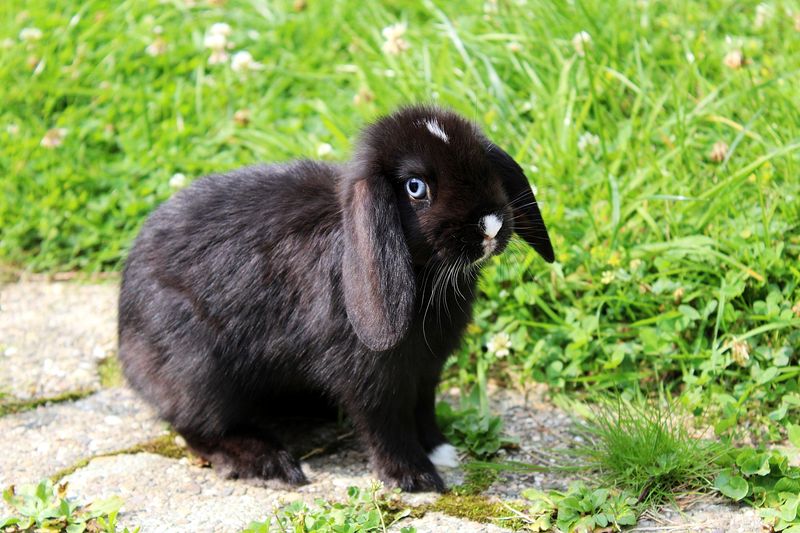Your rabbit has lost his appetite. What to do?

House rabbits like to chew on almost anything they can get their hands on. That's why if your rabbit has lost his appetite, you are beginning to have some worries. If your other pet has refused to eat, it won't seem like anything serious, but if it's a rabbit, the situation can be really unpleasant. Of course, it is best to go to the vet, but there are some things you can do to help your rabbit.
Why might a rabbit stop eating?
The most common reason is stomach problems - ileus. Ileus is when the intestines have difficulty moving food through the digestive tract because the contractions in the intestines stop or become weaker. Ileus is very dangerous for rabbits and, if left untreated, can lead to death.
Ileus does not just happen, there are other problems that lead to it:
- Dental diseases.
- Body abscesses.
- Parasites in the intestines.
- Lice, fleas, or other external parasites.
- Stress or changes in the environment.
- Diseases related to the urinary tract.
- Joint diseases.
- Problems with other organs.
- Infections.
- Tumors.
- Sicknesses of the respiratory tract.
- Lack of fiber.
- Toxins or other poisoning.
Examine your rabbit for possible ileus:
- You can easily see a rabbit's dental problems by simply lifting his lips.
- Some tumors are not hard to detect. If you start stroking your rabbit and feel a lump, that's a reason to go to the vet right away.
- See your rabbit's nose with a mirror. Check that his nostrils are clean.
If your rabbit does not touch food, he has obviously lost his appetite. Sometimes the change can be related to something else. Pay attention to some signs, such as:
- Absence or decreased size of feces.
- The consistency of the feces (hard, sticky, watery).
- The rabbit is refusing his favorite food.
- Decreased body weight.
- After eating, some part remains untouched.
- The rabbit becomes less active.
- The rabbit drinks less water.
- The rabbit begins to grind its teeth.
Home remedies
If you don't see obvious signs of ileus, first think about the environment surrounding your rabbit. Could there be something contributing to the stress? Try to correct things to come to a more familiar option for the rabbit. Then check to see if your rabbit will start to eat as before.
There are some home remedies that help, the main thing is not to delay with them, because if the rabbit is not eating all day - then the situation is too dangerous for his life, and you should take care to show him to the vet right away. Even if you decide to use home remedies - it is better to call the vet and consult.
You can start with vegetable mixes, syringe and baby food. Yes, the rabbit will have to be fed through force to excite his gastrointestinal tract. If the rabbit goes too long without eating, too much gas can build up in the intestines. Gas is one of the worst problems of ileus.
After you have force-fed your bunny - give him a belly massage (still to stimulate his bowels). This will also help to get the gas out.
Need more water. Let the rabbit be well hydrated. Fill his bowl with clean water so he always has access to it. You can also use a syringe until the rabbit defecates like normal.
If the rabbit is still not eating as much, add more greens to his diet, especially those with higher water content (celery, lettuce).
If your rabbit continues to refuse to eat, call the vet right away.
Treatment
To get fluids and food into your rabbit's system, your veterinarian may suggest IV fluids or some other options to increase hydration. The vet may also prescribe medication to stimulate the stomach, pain medication, etc. If you will be force-feeding your rabbit, choose products from Emerald Intensive Care Herbivore, or Oxbow Critical Care - they are veterinary quality, and your rabbit will have good nutrition until he starts eating on his own.
Diagnosis
A veterinarian will certainly want to get to the bottom of the problem. Why exactly did your rabbit stop eating? Sometimes it's not so easy to figure out, but there are several tests available. In addition to a thorough examination of the body, the vet may check the teeth, feces, urine and blood, and order x-rays or some other type of diagnosis.
Sometimes it happens that testing is not advisable because of your pet's health problems. In such cases, it is better to treat the symptoms with medication, but then the problem may return, so be on your guard.
Preventing loss of appetite
If you take good care of your little friend, you can probably get rid of most of the problems before they even appear. Regular dental care will keep your rabbit safe from overgrown teeth and abscesses. Also, make sure your rabbit's cage is always clean. Then you will seriously reduce the chance of parasites or infections.
There are also simpler steps you can take to improve your rabbit's health. He should always have hay, fresh drinking water, and greens. The rabbit's habitat should not change temperature and there should be no stressors.
